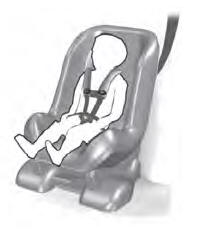Lincoln Aviator 2020-2025 Service Manual / Electrical / Instrumentation and Warning Systems / Parking Aid - Vehicles With: Rear Parking Aid / Removal and Installation - Rear Parking Aid Sensor
Lincoln Aviator: Parking Aid - Vehicles With: Rear Parking Aid / Removal and Installation - Rear Parking Aid Sensor
Removal
-
Remove the rear bumper cover.
Refer to: Rear Bumper Cover (501-19 Bumpers, Removal and Installation).
-
If equipped.
Position aside the connector shield.
.jpg) |
-
Remove the rear parking aid sensor.
-
Disconnect the electrical sensor.
-
Release the tabs.
-
Remove the sensor.
-
Disconnect the electrical sensor.
.jpg) |
Installation
NOTE: Make sure that the isolator rings are installed correctly while installing the sensors.
-
To install, reverse the removal procedure.
-
Carry out the azimuth system check.
Refer to: Azimuth System Check (413-13A Parking Aid - Vehicles With: Rear Parking Aid, General Procedures).
-
Carry out the elevation system check.
Refer to: Elevation System Check (413-13A Parking Aid - Vehicles With: Rear Parking Aid, General Procedures).
-
If any sensor fails the checks, diagnose the sensor fault.
Refer to: Parking Aid (413-13C Parking Aid - Vehicles With: Active Park Assist, Diagnosis and Testing).
 Removal and Installation - Parking Assist Control Module (PAM)
Removal and Installation - Parking Assist Control Module (PAM)
Removal
NOTE:
If installing a new PAM,
it is necessary to upload the module configuration information to the
scan tool prior to removing the module...
Other information:
Lincoln Aviator 2020-2025 Owners Manual: Radio Transceiver Module
Argentina China Djibouti Ghana Indonesia Jamaica Mauritania Moldova Morocco Pakistan Paraguay Serbia South Africa South Korea KCC-REM-DDG-FO3 Syria Taiwan Ukraine United Arab Emirates (U.A.E.) United States and Canada WARNING: Changes or modifications not expressively approved by the party responsible for compliance could void the user's authority to operate the equipment...
Lincoln Aviator 2020-2025 Service Manual: Removal and Installation - Air Distribution Door Actuator
Removal Fully lower the glove compartment. Disconnect the check strap. Push the stop tabs inward. Remove the screws and the air distribution door actuator. Disconnect the electrical connector...
Categories
- Manuals Home
- Lincoln Aviator Owners Manual
- Lincoln Aviator Service Manual
- Description and Operation - Jacking and Lifting
- Drive Modes
- Remove and Reinstall the Battery
- New on site
- Most important about car
Child Seats

Use a child restraint (sometimes called an infant carrier, convertible seat, or toddler seat) for infants, toddlers and children weighing 40 lb (18 kg) or less (generally four-years-old or younger).
Using Lap and Shoulder Belts
WARNING: Do not place a rearward facing child restraint in front of an active airbag. Failure to follow this instruction could result in personal injury or death.
Copyright © 2025 www.liaviator2.com

